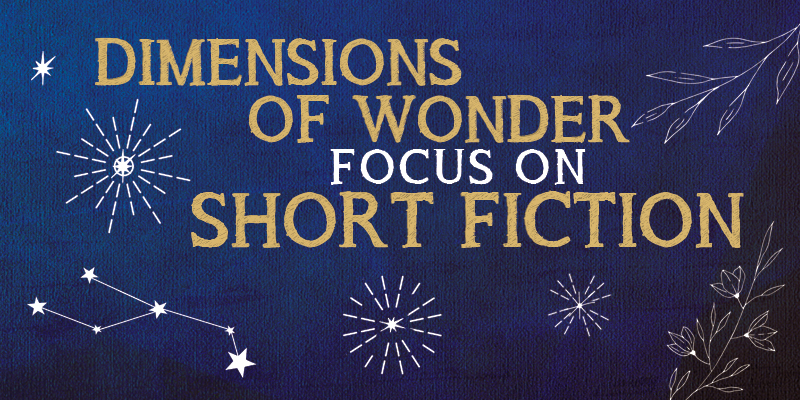Writing Short Stories in the Margins by A.T. Greenblatt
 I have always loved short stories. I don’t remember a time when I ‘‘discovered’’ them. For me, there was nothing to find. They were always there; in school textbooks, homework assignments, in the anthologies I would randomly pick off the shelf at the library. There was never any question either of what I would start writing when I decided to learn story craft. In those early days, reaching the end of a 4,000-word story was daunting enough for a slow writer. Attempting a novel was unthinkable.
I have always loved short stories. I don’t remember a time when I ‘‘discovered’’ them. For me, there was nothing to find. They were always there; in school textbooks, homework assignments, in the anthologies I would randomly pick off the shelf at the library. There was never any question either of what I would start writing when I decided to learn story craft. In those early days, reaching the end of a 4,000-word story was daunting enough for a slow writer. Attempting a novel was unthinkable.
What I didn’t know was that short fiction would become an art form I’d fall in love with and whose creation fit easily within the structure of my life.
I’ve always had a full-time day job throughout my writing career. I like engineering and the tangible work I get to do. More than that, it’s become an important counterpoint to my writing career, not only for the income and the health insurance, which as a disabled person in America is critical for survival, but because when writing is not going well, it’s not the only thing I’m creating. Especially in those early days of writing, the stability of one career gave me the funds to sign up for writing classes and the freedom to experiment with every story I told because I wasn’t relying on it to pay bills.
The biggest drawback of this model is, of course, time. Writing has always been something I’ve done in the margins; late in the evenings, early mornings before work, and on weekends. But that was helpful too, in the early years. It taught me how to put one draft aside when what I was attempting was outside my skill level and to work on something else. It constantly forced me to walk away from projects when it was getting too late, and revisiting it the next day with fresh eyes. Best of all, short stories were a way to quickly get feedback because I had no idea what I was doing – I never took a writing class in college, and my imagination outpaced my skills. I wrote dozens of terrible stories, okay stories, and almost good stories to learn what sort of lies I could get away with and what types of stories I wanted to tell. There was this moment six or seven years ago when a long-time critique partner handed me notes on a draft and said. ‘‘I think you found your writing voice.’’
I remember going to a con after my first pro sale in Daily Science Fiction and feeling like I could participate in the conversation because I had contributed a story to the community’s body of work.
Without these gifts from short fiction, I don’t know if I would be here writing this essay for you today.
Now, almost 14 years into this writing career, I’ve been thinking about my future in it. Short fiction venues have constantly been in need of subscribers in recent years and even the pro-paying, highly read, award-winning magazines are struggling to make ends meet. Recently, it’s been particularly dire with Amazon discontinuing their subscription program and the unknown impact it will have on revenue. Fantasy Magazine has already announced that it will be publishing its last issue in October, despite publishing some truly wonderful and groundbreaking fiction over the last three years. Even before this, half a dozen venues that have published my work, including Daily Science Fiction, have permanently closed up shop. For a writer, it’s incredibly difficult to even imagine making a living on short stories. In over ten years of writing, I haven’t broken five figures, though one year I came close.
Short fiction in SF/F/H, essentially, is a labor of love, by those who write it and those who publish it.
It’s often overlooked, even though it’s where so many of our most beloved authors get their start and test out new ideas. It’s where new authors build confidence and join the community. It is one of the most accessible entry points to speculative fiction for readers because it can be read in one sitting and is often podcasted. So much of it is free online allowing the stories to reach readers around the world and the ones without access to a library.
With magazines fighting for survival and anthologies – including many Year’s Bests – no longer being published, I worry about the future of short fiction in the speculative world. It’s a small but integral part of the industry’s ecosystem. What will happen if short stories, especially the amazing range of diverse stories being told right now, become harder for the next generation of writers, and especially readers, to discover? What happens when those of us who are working in it now, both writers and editors, burn out? Who will we lose when there’s no space in publishing for this art form that can fit neatly in the margins of a life, whether these writers remain in short fiction or move on to write the next groundbreaking trilogy?
I have no doubt that there will always be short fiction being written and published. As for myself, I will always be using it as a way to tell the stories I wanted to find in those library loaned anthologies.
So, when people ask me ‘‘How can I support your work?’’ the answer is simple: Subscribe to magazines, buy anthologies, hire short story writers for tie-in projects. Even if you mostly read novels, invest in this small but critical part of the industry.
 A.T. Greenblatt is a Nebula Award winning writer and mechanical engineer. She lives in New York City where she’s known to frequently subject her friends to various cooking and home brewing experiments. Her work has been nominated for a Hugo, Locus, and Sturgeon Award, has been in multiple Year’s Best anthologies, and has appeared in Tor.com, Beneath Ceaseless Skies, Lightspeed, and Clarkesworld, as well as other fine publications. You can find her online at <atgreenblatt.com> and on Bluesky at @AtGreenblatt.
A.T. Greenblatt is a Nebula Award winning writer and mechanical engineer. She lives in New York City where she’s known to frequently subject her friends to various cooking and home brewing experiments. Her work has been nominated for a Hugo, Locus, and Sturgeon Award, has been in multiple Year’s Best anthologies, and has appeared in Tor.com, Beneath Ceaseless Skies, Lightspeed, and Clarkesworld, as well as other fine publications. You can find her online at <atgreenblatt.com> and on Bluesky at @AtGreenblatt.
FOR MORE FROM OUR FOCUS ON SHORT FICTION ISSUE…
While you are here, please take a moment to support Locus with a one-time or recurring donation. We rely on reader donations to keep the magazine and site going, and would like to keep the site paywall free, but WE NEED YOUR FINANCIAL SUPPORT to continue quality coverage of the science fiction and fantasy field.
©Locus Magazine. Copyrighted material may not be republished without permission of LSFF.









